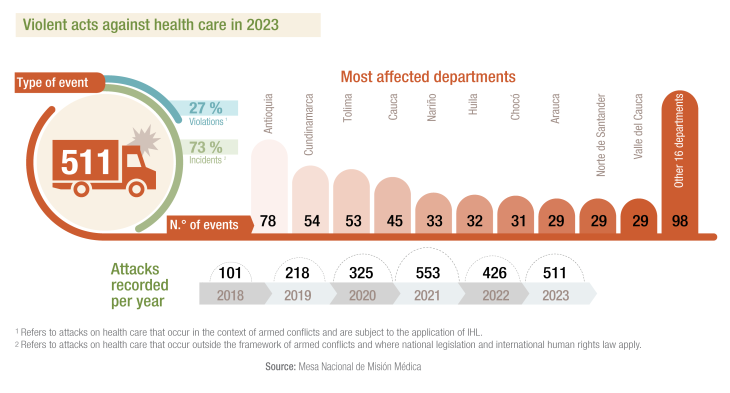During 2023, the National Medical Mission Board recorded 511 violent acts against health care through- out the country. Of these, 140 (27 per cent) were related to armed conflicts. Most were attacks on the life and safety of medical personnel and directly impacted health assistants, nurses, psychologists, dentists, doctors, ambulance drivers and public health teams, who suffered the physical and emotional consequences of these acts.
Cauca, Chocó, Arauca, Nariño and Caquetá were the most affected. In some of these departments, entire teams of medical personnel were forced to stop work- ing, resulting in the complete lack of health services for entire communities.
It is worth noting the increase in intensity of this violence, as reflected in the homicide of nine people – the highest figure recorded in the last five years. Five of these people were traditional healers in Cauca and Valle del Cauca. This loss not only strips indigenous, Afro-descendent and peasant communities of the ancestral knowledge of those who care for them from a cultural perspective, but also puts at risk the survival of populations that no longer have a first response option, which is sometimes the only form of health care available in their territories. In this regard, we call for respect for the life and safety of those who provide health care, including community and traditional healers, who are also protected by IHL.
The south-west has suffered in many ways due to armed conflict and violence. There has been displacement, the presence of explosive devices and attacks on health care. These events impact society as a whole, and that’s why disrespect for IHL should not become the norm
Kian Abbasian, former Head of the ICRC Subdelegation in Cali
Through our Mental Health for Medical Personnel Victims of Violence programme, we identified that 86 % of the personnel who participated in the programme presented worrying levels of psychological suffering. Among the most common symptoms are anxiety, cognitive difficulties and irritability, in addition to the individual suffering experienced by health-care workers, which limits their ability to care for others.
Health workers providing support to communities in areas most affected by armed conflicts and violence are guardians of life. Their work enables those who depend on their care to remain hopeful. These commu- nity care providers, traditional healers, health assistants, psychologists, dentists, nurses, doctors, ambulance drivers and health support personnel work tirelessly to heal the physical and mental wounds caused by armed conflicts in Colombia, while experiencing the threat of violence every day. They must be protected and respected at all times.
We acknowledge Source link for the information.




